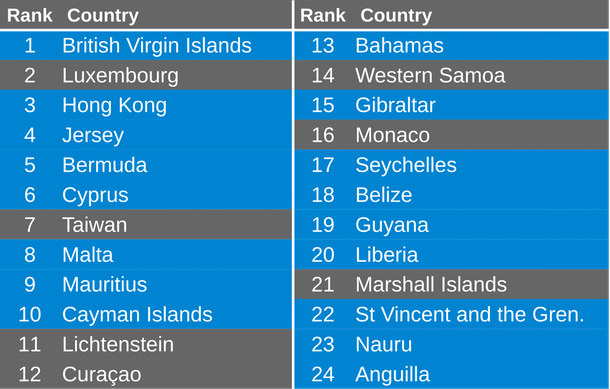|
Singapore Sling (tax Avoidance)
A Singapore Sling is a tax avoidance scheme in which a large multinational company sells products to a subsidiary owned by them in a jurisdiction with lower tax rates, which acts as a 'marketing hub'. The subsidiary then sells the product to end users, marking up its value and attributing the mark-up to various marketing activities undertaken by the subsidiary. The parent company retains a higher profit margin due to the lower tax rate. Singapore is a popular location of such subsidiaries, given its low tax rates and its willingness to grant large multinationals 'sweetheart deals' – an extremely low tax rate in exchange for locating the multinational's marketing activities in Singapore. It is currently under investigation as an abusive practice in Australia. See also * Tax exporting * Tax inversion * Double Irish * Dutch Sandwich * Bermuda Black Hole Bermuda black hole refers to base erosion and profit shifting (BEPS) tax avoidance schemes in which untaxed global profits en ... [...More Info...] [...Related Items...] OR: [Wikipedia] [Google] [Baidu] |
Tax Avoidance
Tax avoidance is the legal usage of the tax regime in a single territory to one's own advantage to reduce the amount of tax that is payable by means that are within the law. A tax shelter is one type of tax avoidance, and tax havens are jurisdictions that facilitate reduced taxes. Tax avoidance should not be confused with tax evasion, which is illegal. Forms of tax avoidance that use legal tax laws in ways not necessarily intended by the government are often criticized in the court of public opinion and by journalists. Many corporations and businesses that take part in the practice experience a backlash from their active customers or online. Conversely, benefiting from tax laws in ways that were intended by governments is sometimes referred to as tax planning. The World Bank's World Development Report 2019 on the future of work supports increased government efforts to curb tax avoidance as part of a new social contract focused on human capital investments and expanded social p ... [...More Info...] [...Related Items...] OR: [Wikipedia] [Google] [Baidu] |
Multinational Corporation
A multinational company (MNC), also referred to as a multinational enterprise (MNE), a transnational enterprise (TNE), a transnational corporation (TNC), an international corporation or a stateless corporation with subtle but contrasting senses, is a corporate organization that owns and controls the production of goods or services in at least one country other than its home country. Control is considered an important aspect of an MNC, to distinguish it from international portfolio investment organizations, such as some international mutual funds that invest in corporations abroad simply to diversify financial risks. Black's Law Dictionary suggests that a company or group should be considered a multinational corporation "if it derives 25% or more of its revenue from out-of-home-country operations". Most of the largest and most influential companies of the modern age are publicly traded multinational corporations, including '' Forbes Global 2000'' companies. History Colonialism Th ... [...More Info...] [...Related Items...] OR: [Wikipedia] [Google] [Baidu] |
Sweetheart Deal
A sweetheart deal or sweetheart contract is a contractual agreement, usually worked out in secret, that greatly benefits some of the parties while inappropriately disadvantaging other parties or the public at large. The term was coined in the 1940s to describe corrupt labor contracts that were favorable to the employer rather than the workers, and usually involved some kind of kickback or special treatment for the labor negotiator. The term is also applied to special arrangements between private corporations and government entities, whereby the corporation and sometimes a government official reap the benefits, rather than the public. No-bid contracts may be awarded to people who have political connections or make donations to influential politicians. Sometimes a sweetheart deal involves tax breaks or other inducements to get a corporation to do business in that city or state. A "sweetheart settlement" may also occur in a legal context. For example, in a class-action lawsuit the ... [...More Info...] [...Related Items...] OR: [Wikipedia] [Google] [Baidu] |
Tax Exporting
Tax exporting occurs when a country (or other jurisdiction) shifts its tax burden (partially) abroad. For example, if residents of country A hold shares of a company in country B, the government in B might want to levy an inefficiently high tax on this company's profits since the tax is partially borne by the shareholders in A. Tax exporting does not necessarily involve direct taxation of foreign residents. It can also work through other economic channels, such as price changes. See also * Capital flight * Capital strike * Luxembourg leaks * Tax avoidance * Tax competition * Tax inversion * Double Irish arrangement The Double Irish arrangement was a base erosion and profit shifting (BEPS) corporate tax avoidance tool used mostly by United States multinationals since the late 1980s to avoid corporate taxation on non-U.S. profits. It was the largest tax ... References Further reading * * * * International taxation Tax {{tax-stub ... [...More Info...] [...Related Items...] OR: [Wikipedia] [Google] [Baidu] |
Tax Inversion
A tax inversion or corporate tax inversion is a form of tax avoidance where a corporation restructures so that the current parent is replaced by a foreign parent, and the original parent company becomes a subsidiary of the foreign parent, thus moving its tax residence to the foreign country. Executives and operational headquarters can stay in the original country. The US definition requires that the original shareholders remain a majority control of the post-inverted company. The majority of the less than 100 material tax inversions recorded since 1993 have been of US corporations (85 inversions), seeking to pay less to the US corporate tax system. The only other jurisdiction to experience a material outflow of tax inversions was the United Kingdom from 2007 to 2010 (22 inversions); however, UK inversions largely ceased post the reform of the UK corporate tax code from 2009 to 2012. The first inversion was McDermott International in 1983. Reforms by US Congress in 2004 hal ... [...More Info...] [...Related Items...] OR: [Wikipedia] [Google] [Baidu] |
Double Irish (tax Avoidance)
The Double Irish arrangement was a base erosion and profit shifting (BEPS) corporate tax avoidance tool used mostly by United States multinationals since the late 1980s to avoid corporate taxation on non-U.S. profits. It was the largest tax avoidance tool in history and by 2010 was shielding US$100 billion annually in US multinational foreign profits from taxation, and was the main tool by which US multinationals built up untaxed offshore reserves of US$1 trillion from 2004 to 2018. Traditionally, it was also used with the Dutch Sandwich BEPS tool; however, 2010 changes to tax laws in Ireland dispensed with this requirement. Despite US knowledge of the Double Irish for a decade, it was the European Commission that in October 2014 forced Ireland to close the scheme, starting in January 2015. However, users of existing schemes, such as Apple, Google, Facebook and Pfizer, were given until January 2020 to close them. At the announcement of the closure it was known that multina ... [...More Info...] [...Related Items...] OR: [Wikipedia] [Google] [Baidu] |
Dutch Sandwich (tax Avoidance)
Dutch Sandwich is a base erosion and profit shifting (BEPS) corporate tax tool, used mostly by U.S. multinationals to avoid incurring EU withholding taxes on untaxed profits as they were being moved to non-EU tax havens (such as the Bermuda black hole). These untaxed profits could have originated from within the EU, or from outside the EU, but in most cases were routed to major EU corporate-focused tax havens, such as Ireland and Luxembourg, by the use of other BEPS tools. The Dutch Sandwich was often used with Irish BEPS tools such as the Double Irish, the Single Malt and the Capital Allowances for Intangible Assets ("CAIA") tools. In 2010, Ireland changed its tax-code to enable Irish BEPS tools to avoid such withholding taxes without needing a Dutch Sandwich. Explanation The structure relies on the tax loophole that most EU countries will allow royalty payments be made to other EU countries without incurring withholding taxes. However, the Dutch tax code allows royalty p ... [...More Info...] [...Related Items...] OR: [Wikipedia] [Google] [Baidu] |
Bermuda Black Hole (tax Avoidance)
Bermuda black hole refers to base erosion and profit shifting (BEPS) tax avoidance schemes in which untaxed global profits end up in Bermuda, which is considered a tax haven. The term was most associated with US technology multinationals such as Apple and Google who used Bermuda as the "terminus" for their Double Irish arrangement tax structure. Definition "Bermuda black hole" was used in relation to US corporate tax strategies that routed un-taxed profits to Bermuda, where they did not emerge again for fear of being subject to US corporation tax. Instead, the untaxed profits were "lent out" to the corporate parent, or its subsidiaries, thus avoiding the risk of incurring US taxation. The Bermuda black hole led to US corporations amassing over US$1 trillion in offshore locations from 2004 to 2017 (before the Tax Cuts and Jobs Act of 2017). A "Bermuda black hole" became the most favoured common final destination for the Double Irish with a Dutch Sandwich base erosion and pro ... [...More Info...] [...Related Items...] OR: [Wikipedia] [Google] [Baidu] |
K2 (tax Scheme)
K2 was an offshore wealth management scheme in which salaries of individuals in the United Kingdom were channelled through shell corporations in Jersey, Channel Islands. In June 2012, media reporting of people using K2 for the purposes of tax avoidance was followed by the United Kingdom's Prime Minister David Cameron characterising the scheme as "morally wrong". Later that year the UK government began to introduce legislation to deter people from using such schemes. Operation The K2 scheme was promoted by a Kirkcaldy-based accounting firm, Peak Performance. The scheme involved companies having their main operations in the UK and shell companies offshore. An employee of the UK company would quit their job and then be rehired by the offshore company to the UK. The offshore company would pay a lower salary than the person was originally on but would additionally loan them a large sum of money. Those loans would then be written down as tax liabilities to reduce the amount of tax ... [...More Info...] [...Related Items...] OR: [Wikipedia] [Google] [Baidu] |


.jpg)


